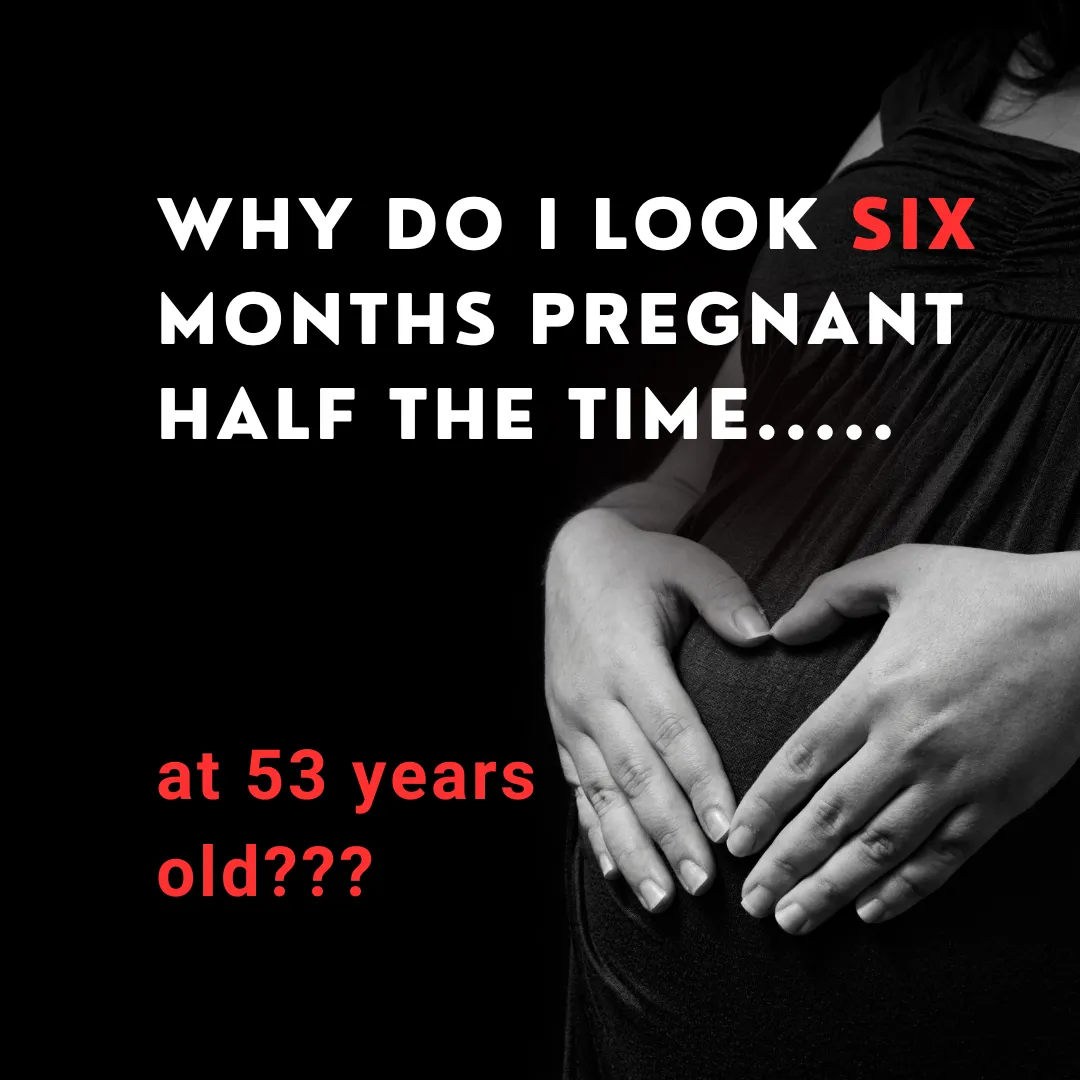
Why Do Why You Sometimes Look 6 Months Pregnant All of a Sudden: The Science Behind Hormone Decline and Extreme Menopausal Belly Bloat
If you’ve ever looked down and thought, “Why do I suddenly look 6 months pregnant?” — you’re not imagining it.
For many women in perimenopause and menopause, belly bloat isn’t just mild puffiness. It’s a hard, swollen, uncomfortable distension that makes clothes unwearable, leaves you feeling embarrassed, and often shows up out of nowhere — even when you haven’t overeaten.
This is not “just aging.” It’s the result of how your gut and hormones change in midlife.
What Causes the “Pregnant Belly” Look in Menopause?
1. Estrogen Decline Changes Digestion
Estrogen does far more than regulate cycles. It protects the gut lining, helps regulate fluid balance, and keeps inflammation in check.
When estrogen declines:
Your gut lining becomes more permeable (“leaky”), making you more reactive to foods.
Gas and fluid build up more easily, creating visible swelling.
Digestion slows, which means food sits in the gut longer, causing distension.
This is why you can eat the same meals you always did — but suddenly your belly balloons.
2. The Microbiome Shifts With Hormone Loss
Your microbiome — the trillions of bacteria that help digest food — thrives on hormonal balance. Estrogen supports diversity and strength of those bacteria.
When estrogen drops:
The microbiome loses stability.
Foods you once tolerated fine (especially gluten and dairy) now ferment, causing gas and bloating.
Inflammation rises, making the belly feel rock-hard and uncomfortable.
That’s why many women feel blindsided: “I could eat cheese or bread last year, but now I look pregnant after one serving.” It’s not in your head — it’s the gut-hormone connection.
3. Cortisol and Stress Make It Worse
High stress in midlife isn’t just mental — it’s physical. Stress hormones like cortisol affect digestion by:
Slowing motility (how fast food moves through the gut).
Altering the gut microbiome, favoring “bad” bacteria.
Increasing gut permeability and inflammation.
The result? More gas, more water retention, and bigger bloating episodes.
Why This Isn’t “Just Aging”
Aging is natural. But looking six months pregnant from bloating after a normal meal? That’s not a requirement of getting older.
This kind of distension is a symptom of hormone decline, microbiome changes, and gut inflammation — all things you can influence.
How to Reduce Extreme Menopausal Belly Bloat
Here are science-backed steps that help calm the gut, reduce swelling, and make you feel more comfortable.
1. Prioritize Protein First
Protein digests more steadily, stabilizes blood sugar, and doesn’t ferment in the gut the way carbs often do. Aim for 80g daily spread across meals.
2. Eliminate Gluten and Dairy for a Trial Period
Even if you ate them for years without issue, your gut may not handle them the same way after hormone decline.
Gluten
Stimulates the release of zonulin, which loosens the tight junctions in your gut lining, contributing to leaky gut.
A more permeable gut allows toxins to enter the blood stream thus causing system wide inflammation and gas to build.
Dairy
Declining hormones reduce enzymes and stomach acid needed to break down lactose and casein.
Instead of digesting smoothly, dairy ferments in the gut → gas, bloating, and discomfort.
👉 These are the two most common food triggers for midlife women. Cutting them for 2–3 weeks often makes a dramatic difference.
3. Support Your Gut With Key Supplements
L-Glutamine: Helps “seal” the gut lining, reducing leaky gut and inflammation. A stronger barrier = less bloating.
Nighttime Probiotic with digestive enzymes: Beneficial bacteria help digest food and reduce gas. Taking an additional probiotic at night allows bacteria to colonize while your body repairs.
4. Cut Back on Alcohol (Especially Nightly Wine)
Alcohol directly irritates the gut lining and disrupts the microbiome. In menopause, that means:
More inflammation → BIG TIME swelling.
More imbalance → food fermenting instead of digesting.
Worse sleep → slower gut repair.
A nightly wine habit is one of the fastest ways to keep bloat extreme. Even a few nights off per week can make a big difference.
5. Manage Stress Proactively
Chronic stress slows digestion and worsens bloating. Walk daily, practice deep breathing, or strength train — not to burn calories, but to regulate cortisol and help your gut function.
6. Focus on Sleep
Seven to eight hours of quality sleep is essential. During deep sleep, your gut lining repairs itself and your microbiome restores balance. Without it, bloating lingers.
The Bottom Line
If your belly suddenly makes you look 6 months pregnant, it doesn’t mean you’re stuck this way.
Menopausal bloating isn’t “just aging.” It’s the result of hormone decline, microbiome changes, and stress — and with the right strategy, it can dramatically improve.
With supportive nutrition, gut care, and lifestyle shifts, you can reduce the swelling, feel lighter, and finally recognize yourself in the mirror again.
Ready for Real Relief From Menopause Bloat?
You don’t have to keep guessing what foods to cut, what supplements to try, or why your body feels so different. This is exactly what I help women with every single day.
Through my menopause coaching programs, I guide women step by step to:
✔ Identify their specific food triggers (like gluten, dairy, or alcohol).
✔ Reset digestion and reduce bloating with gut-healing strategies.
✔ Balance hormones naturally through nutrition, movement, and lifestyle.
✔ Feel lighter, clearer, and confident in their own skin again.
If you’re tired of looking 6 months pregnant by the end of the day — and you’re ready to feel like yourself again — I’d love to support you.
👉 Click here to learn more about my coaching OR Message me today to get started (WhatsAPP)
